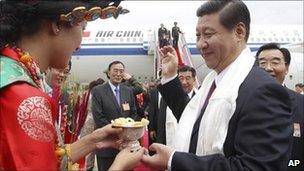Xi Jinping: China will 'smash' Tibet separatism
- Published

Xi Jinping looks set to follow the policies of his predecessors in Tibet
The man expected to be China's next president has promised to "smash" any attempts to destabilise Tibet.
Xi Jinping, who is due to succeed President Hu Jintao in 2013, said he would fight against "separatist activities" linked to the Dalai Lama.
He was speaking in Lhasa as part of a trip to mark 60 years since the communists took over Tibet.
Analysts say the speech suggests Mr Xi is unlikely to veer from the policies of his predecessors.
Beijing has for years been critical of the Dalai Lama, regularly denouncing him as a "splittist" in official media.
At the weekend, Beijing was highly critical of US President Barack Obama's decision to meet the Tibetan spiritual leader.
The communist government says Tibet has always been an integral part of China, and that their policies have brought economic development to a chronically poor area.
But many Tibetans accuse Beijing of cracking down on free speech, suppressing their religion and culture, and encouraging the immigration of many Han Chinese to the area.
The Dalai Lama, who fled to India in 1959, has publicly said many times in recent years that he wants more freedom for Tibetans, not necessarily independence.
Mr Xi, who is currently vice-president, made his speech in front of the Potala Palace, which is the Dalai Lama's traditional seat.
"[We] should thoroughly fight against separatist activities by the Dalai clique by firmly relying on all ethnic groups... and completely smash any plot to destroy stability in Tibet and jeopardise national unity," he said.
"The extraordinary development of Tibet over the past 60 years points to an irrefutable truth: Without the Chinese Communist Party, there would have been no new China, no new Tibet."
Little is known about Mr Xi's political leanings, because China's leaders-in-waiting are rarely allowed to make major speeches in the run-up to changes in the Communist Party's highest echelons.
Mr Hu has often pushed the idea of a harmonious society depending on the sharing of wealth between the country's industrial powerhouses on the east coast, and its rural areas in the west.